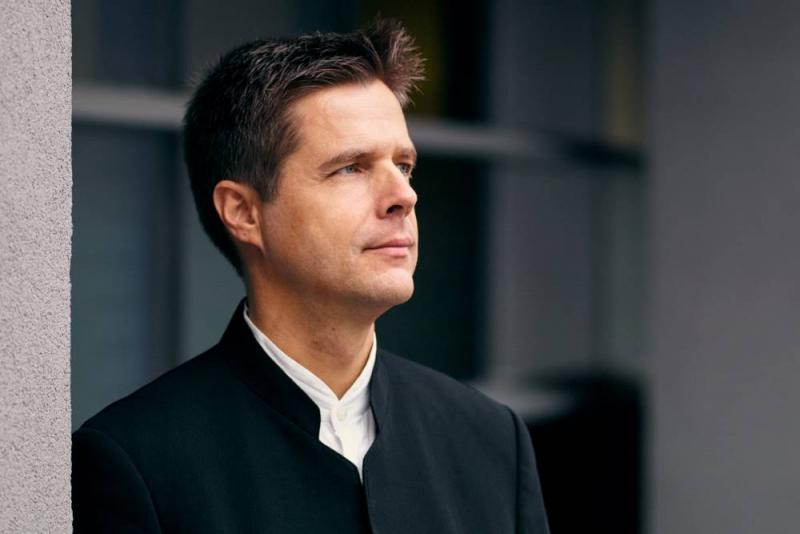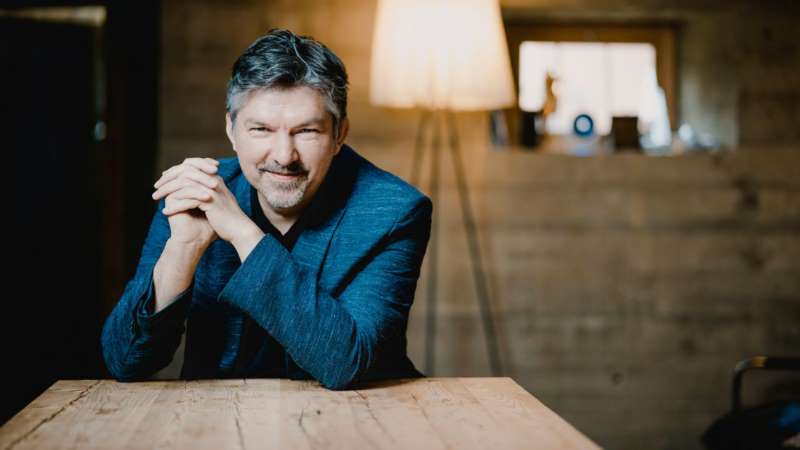Bauer, CBSO, Koenig, Symphony Hall Birmingham review - Christoph pulls it off | reviews, news & interviews
Bauer, CBSO, Koenig, Symphony Hall Birmingham review - Christoph pulls it off
Bauer, CBSO, Koenig, Symphony Hall Birmingham review - Christoph pulls it off
A Widmann premiere triumphs in an unexpected but outstanding Birmingham debut

Mirga Gražinytė-Tyla’s programmes in Birmingham are so personal – so utterly bespoke – that in the event of her being indisposed, they present something of a problem. That’s what happened this week.
The answer, it appears, is the Dresden-born Christoph Koenig, making his CBSO debut in repertoire that – Brahms apart – surely can’t be everyday fodder on his usual beat. If he’d never previously encountered the two Elgar songs, it certainly didn’t show in this natural, affectionate performance: gently bringing out the pastel woodwinds and glinting harps of Elgar’s delicately scored accompaniments as the CBSO Youth Chorus sent luminous melodic lines soaring out into the vast space of Symphony Hall. Their regular conductor Julian Wilkins (playing the organ tonight) has to share the credit for that, and he rightly shared the applause.
And if Koenig really had mastered the Widmann in just 48 hours, that didn’t show either – though here, too, he had the support of an old hand; the baritone Thomas E Bauer (pictured below), who premiered the work in its original piano version in 2015. It’s always fun, before a Widmann premiere, to look at the panoply on stage and guess where he’s going to go with it. There was a set of chains straight out of Gurrelieder, additional trombones, two harps, accordion and the towering presence of a contrabass clarinet. It all pointed towards the slightly seedier end of German late romanticism; and that’s pretty much what we got. Widmann’s eight songs set texts ranging from the contemporary German poet Peter Härtling to that old Mahlerian standby, Des Knaben Wunderhorn, in a musical idiom that ranges from Weimar cabaret to Berg-like expressionism. 
So the orchestra laid out shimmering textures, pregnant with doomy gongs and trickling harps, its earnestness under constant assault from trombone eruptions, queasy deflations and – at one point – a woozy oompah waltz on the brass. Koenig marshalled his vast forces with astonishing precision and an almost hallucinatory clarity, with only his treatment of the big fifth song Eifersucht hinting at any hesitation or caution, and then only obliquely. Crucially, he always kept a path through the texture open for Bauer, who snarled, spat and hissed out his part with macabre relish; stamping, gesturing flamboyantly and at one point sauntering over to the orchestral piano for a spot of informal musical bantz.
It was all hugely entertaining, and more than enough to offset Widmann’s frustrating habit of cancelling a lyrical line just as it had started to unfurl. But then, in the slow final song – Einsam will ich untergehen, a sort of eerie, fever-dream dual homage to Strauss’s Im Abendrot and Mahler’s Ich bin der Welt abhanden gekommen – Widmann finally surrendered to the lyrical impulse. Bauer’s warm, bronzed baritone took wing at rapturous length as Koenig eased into the final sunset. The composer, who looked delighted, was called back twice by an enthusiastic audience.
As for the Brahms: well, if Koenig initially seemed almost diffident about those majestic opening phrases, it soon opened out into a performance of glowing, songful breadth punctuated by moments of chamber music intimacy. Koenig brought the strings down to a lilting near whisper as clarinettist Joanna Patton uncoiled her melody – pure poetry. Yet, leaving aside the third movement (which was so tender and hesitant that it felt at times as if was about to stop altogether) it never felt contrived, and the natural flow of the music was uncompromised. Koenig, once again, showed himself a master of the long, perfectly paced decrescendo; and if this wasn’t the most dramatic Brahms Third I’ve ever heard, it was certainly one of the most touching. Before taking his applause, he stopped to embrace first violinist David Gregory, the CBSO’s longest-serving member, who retired tonight after 42 years of service (making him the last remaining member of the orchestra to predate Simon Rattle). The audience cheered and the orchestra beamed as Koenig finally brought them to their feet. I suspect we’ll be seeing him in Birmingham again.
rating
Share this article
The future of Arts Journalism
You can stop theartsdesk.com closing!
We urgently need financing to survive. Our fundraising drive has thus far raised £49,000 but we need to reach £100,000 or we will be forced to close. Please contribute here: https://gofund.me/c3f6033d
And if you can forward this information to anyone who might assist, we’d be grateful.

Subscribe to theartsdesk.com
Thank you for continuing to read our work on theartsdesk.com. For unlimited access to every article in its entirety, including our archive of more than 15,000 pieces, we're asking for £5 per month or £40 per year. We feel it's a very good deal, and hope you do too.
To take a subscription now simply click here.
And if you're looking for that extra gift for a friend or family member, why not treat them to a theartsdesk.com gift subscription?
more Classical music
 Cho, LSO, Pappano, Barbican review - finely-focused stormy weather
Chameleonic Seong-Jin Cho is a match for the fine-tuning of the LSO’s Chief Conductor
Cho, LSO, Pappano, Barbican review - finely-focused stormy weather
Chameleonic Seong-Jin Cho is a match for the fine-tuning of the LSO’s Chief Conductor
 Classical CDs: Shrouds, silhouettes and superstition
Cello concertos, choral collections and a stunning tribute to a contemporary giant
Classical CDs: Shrouds, silhouettes and superstition
Cello concertos, choral collections and a stunning tribute to a contemporary giant
 Appl, Levickis, Wigmore Hall review - fun to the fore in cabaret and show songs
A relaxed evening of light-hearted fare, with the accordion offering unusual colours
Appl, Levickis, Wigmore Hall review - fun to the fore in cabaret and show songs
A relaxed evening of light-hearted fare, with the accordion offering unusual colours
 Lammermuir Festival 2025, Part 2 review - from the soaringly sublime to the zoologically ridiculous
Bigger than ever, and the quality remains astonishingly high
Lammermuir Festival 2025, Part 2 review - from the soaringly sublime to the zoologically ridiculous
Bigger than ever, and the quality remains astonishingly high
 BBC Proms: Ehnes, Sinfonia of London, Wilson review - aspects of love
Sensuous Ravel, and bittersweet Bernstein, on an amorous evening
BBC Proms: Ehnes, Sinfonia of London, Wilson review - aspects of love
Sensuous Ravel, and bittersweet Bernstein, on an amorous evening
 Presteigne Festival 2025 review - new music is centre stage in the Welsh Marches
Music by 30 living composers, with Eleanor Alberga topping the bill
Presteigne Festival 2025 review - new music is centre stage in the Welsh Marches
Music by 30 living composers, with Eleanor Alberga topping the bill
 Lammermuir Festival 2025 review - music with soul from the heart of East Lothian
Baroque splendour, and chamber-ensemble drama, amid history-haunted lands
Lammermuir Festival 2025 review - music with soul from the heart of East Lothian
Baroque splendour, and chamber-ensemble drama, amid history-haunted lands
 BBC Proms: Steinbacher, RPO, Petrenko / Sternath, BBCSO, Oramo review - double-bill mixed bag
Young pianist shines in Grieg but Bliss’s portentous cantata disappoints
BBC Proms: Steinbacher, RPO, Petrenko / Sternath, BBCSO, Oramo review - double-bill mixed bag
Young pianist shines in Grieg but Bliss’s portentous cantata disappoints
 theartsdesk at the Lahti Sibelius Festival - early epics by the Finnish master in context
Finnish heroes meet their Austro-German counterparts in breathtaking interpretations
theartsdesk at the Lahti Sibelius Festival - early epics by the Finnish master in context
Finnish heroes meet their Austro-German counterparts in breathtaking interpretations
 Classical CDs: Sleigh rides, pancakes and cigars
Two big boxes, plus new music for brass and a pair of clarinet concertos
Classical CDs: Sleigh rides, pancakes and cigars
Two big boxes, plus new music for brass and a pair of clarinet concertos
 Waley-Cohen, Manchester Camerata, Pether, Whitworth Art Gallery, Manchester review - premiere of no ordinary violin concerto
Images of maternal care inspired by Hepworth and played in a gallery setting
Waley-Cohen, Manchester Camerata, Pether, Whitworth Art Gallery, Manchester review - premiere of no ordinary violin concerto
Images of maternal care inspired by Hepworth and played in a gallery setting
 BBC Proms: Barruk, Norwegian Chamber Orchestra, Kuusisto review - vague incantations, precise laments
First-half mix of Sámi songs and string things falters, but Shostakovich scours the soul
BBC Proms: Barruk, Norwegian Chamber Orchestra, Kuusisto review - vague incantations, precise laments
First-half mix of Sámi songs and string things falters, but Shostakovich scours the soul

Add comment